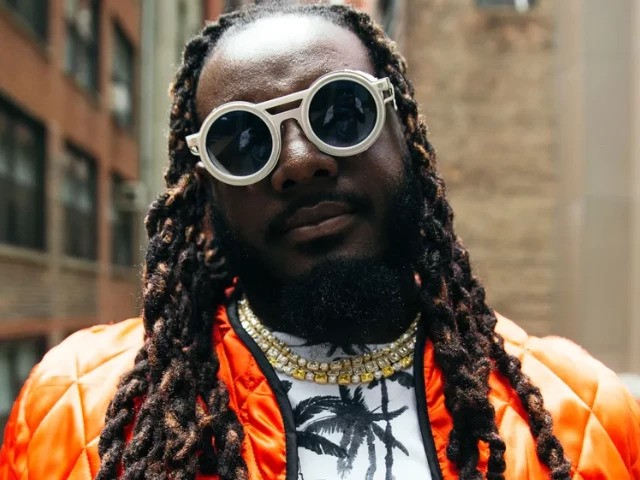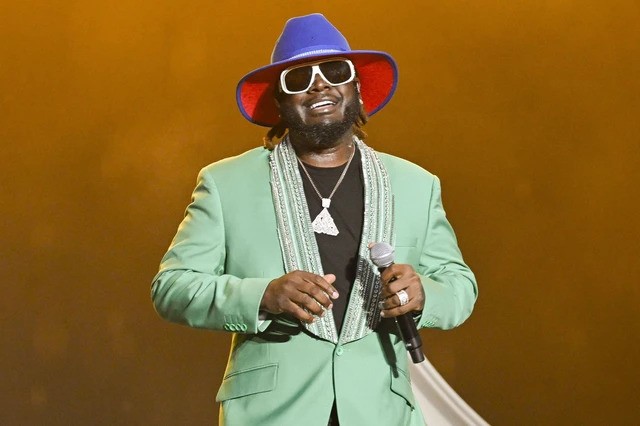On June 2, 2025, Grammy Award-winning rapper and singer T-Pain shared a brief but powerful video on his social media channels that left fans speculating about what could be a monumental shift in the artist’s career. Clocking in at just 43 seconds, the video was filled with gratitude, reflection, and a tinge of finality.
“I gave you all everything for 20 years,” T-Pain said, his voice calm but charged with emotion. “I’m grateful to each of you for making this such a great ride. Right now, I just need some time for me.”
He ended with a line that quickly lit up social media platforms with concern, admiration, and curiosity: “This might be it.”
As is often the case with artists of T-Pain’s caliber, the message was deliberately vague. He didn’t outright announce retirement, but the implication hung heavy. Fans, music critics, and fellow artists alike took to the internet to interpret what exactly “this might be it” means.
Is T-Pain walking away from the music business for good? Is this a temporary hiatus after two grueling decades of grinding in the industry? Or is it a clever lead-up to a new project—perhaps his final one?
Only T-Pain truly knows the answer for now. But what’s clear is this: his impact on music is permanent, and his voice—robotic and human all at once—helped define an era.
Faheem Rashad Najm, better known as T-Pain, was born and raised in Tallahassee, Florida. His hometown has always played a central role in his story. It’s where he began making music at a young age and developed the genre-blurring style that would later become his signature.
In 2005, T-Pain exploded onto the mainstream scene with his debut album Rappa Ternt Sanga. The album featured hits like “I’m Sprung” and “I’m N Luv (Wit a Stripper),” both of which showcased his distinctive Auto-Tuned vocals—a technique that was, at the time, met with both fascination and criticism.
But T-Pain didn’t just embrace the technology—he mastered it. He turned Auto-Tune into a creative instrument rather than a corrective tool. Over time, what initially seemed like a novelty became an artistic choice, one that inspired a whole generation of artists from Kanye West to Travis Scott and Lil Uzi Vert.
His next few albums—Epiphany (2007), Thr33 Ringz (2008), and Revolver (2011)—cemented his reputation as a hitmaker. Tracks like “Buy U a Drank,” “Bartender,” and collaborations with Kanye West (“Good Life”) and Flo Rida (“Low”) became instant chart-toppers. During this period, T-Pain wasn’t just popular—he was defining the sound of a generation.
Despite his early success, T-Pain’s career hasn’t always been smooth sailing. By the early 2010s, the popularity of Auto-Tune began to wane. Newer artists who had been influenced by T-Pain were now becoming competitors, and audiences started craving different sounds. The industry moved fast, and T-Pain was at risk of being left behind.

But instead of fading away, he reinvented himself.
In 2014, T-Pain shocked the music world by performing an NPR Tiny Desk concert—without Auto-Tune. His raw vocal talent stunned fans and skeptics alike. It was a moment of musical vulnerability that proved he didn’t need digital effects to shine.
This performance marked a turning point. T-Pain was no longer just a symbol of a digital age in music—he was a craftsman, an artist with range and resilience. In the years that followed, he released more music, went on tour, and took part in various media ventures, including a triumphant win on The Masked Singer in 2019.
If there was ever any doubt about how much T-Pain means to his hometown, 2024 erased it. In November of that year, the city of Tallahassee officially renamed a stretch of Pasco Street “T-Pain Lane,” honoring the artist in a ceremony filled with local pride and national attention. The street runs from Orange Avenue to Tucker Street and ends at Bond Elementary School—a symbolic nod to T-Pain’s roots.
Later that same day, he headlined a concert at the Adderley Amphitheater as part of Tallahassee’s bicentennial celebration. It was a full-circle moment: the hometown kid turned global superstar returning to where it all began, performing for a sold-out crowd in a city that has never stopped cheering for him.
Speaking to the crowd, T-Pain was clearly moved. “This is where I learned who I was, who I wanted to be, and how to fight for my dreams,” he told the audience. “This means more than any award.”
Following the emotional homecoming in Tallahassee, talk began to swirl about T-Pain bringing his popular Wiscansin Fest—a music festival he created that blends music, culture, and fan interaction—to Florida. Event organizers and city officials expressed interest in the idea, and fans were eager at the prospect.
It seemed like T-Pain was just getting started again.
That’s what made the June 2 video so surprising. Just months after celebrating his roots and teasing future projects, he was now hinting at stepping away.
Of course, artistic careers are not linear. They ebb and flow, and few artists have navigated those tides as gracefully as T-Pain has. But this time, it feels like something deeper is happening—like he’s considering not just what’s next for his career, but what’s next for himself.
T-Pain has been candid in the past about the emotional and psychological strain of his career. In interviews, he’s spoken about bouts of depression, industry pressure, and the isolation that can come with fame.
“People think that because you’re successful, you’re happy. But sometimes success just makes you lonelier,” he once said in an interview.
For an artist like T-Pain—whose public persona has often been wrapped in humor, creativity, and high-energy performances—the internal battles are easy to miss. His recent video suggests a man who has given a lot, maybe too much, and is now looking inward.
It’s a familiar story for many long-time performers: the tour buses, studio sessions, interviews, and social media posts can all add up. After 20 years of giving everything to the world, it seems T-Pain is finally ready to give something back to himself—peace, space, time.

If T-Pain truly is preparing to bow out, he does so with a resume few can rival. More than a dozen Billboard Hot 100 hits. Multiple Grammy Awards. Collaborations with everyone from Chris Brown to Lil Wayne to Taylor Swift. And perhaps most importantly, a reshaping of what it means to be a vocal artist in the 21st century.
His influence is undeniable. Entire waves of artists have borrowed from T-Pain’s playbook, and yet none have quite managed to replicate the magic. There’s something unique about the way he blended vulnerability with bravado, love with playfulness, and technology with raw soul.
Beyond the music, T-Pain has also carved out a role as a cultural ambassador—someone who has fun with the craft, connects deeply with fans, and always champions creativity over conformity.
Whether this is the end or simply a reflective interlude, one thing is clear: T-Pain is thinking deeply about his place in the world—not just as an artist, but as a person. His message on June 2 may have left fans unsettled, but it also provided something rare in today’s media landscape: honesty.
There’s a quiet bravery in stepping back, especially at a time when the spotlight is still warm. If T-Pain is preparing to close this chapter, he’s doing it on his own terms—with grace, gratitude, and a powerful reminder that even the loudest voices sometimes need silence.
In his own words: “Right now, I just need some time for me.”
And if that’s what he needs, then fans—whether they grew up on “Buy U a Drank” or discovered him through Tiny Desk—will surely understand. T-Pain has given the world two decades of innovation, entertainment, and unforgettable sound. He’s earned whatever comes next.
Until we hear from him again—whether it’s a return, a reinvention, or a farewell—we’ll be here, singing along.










